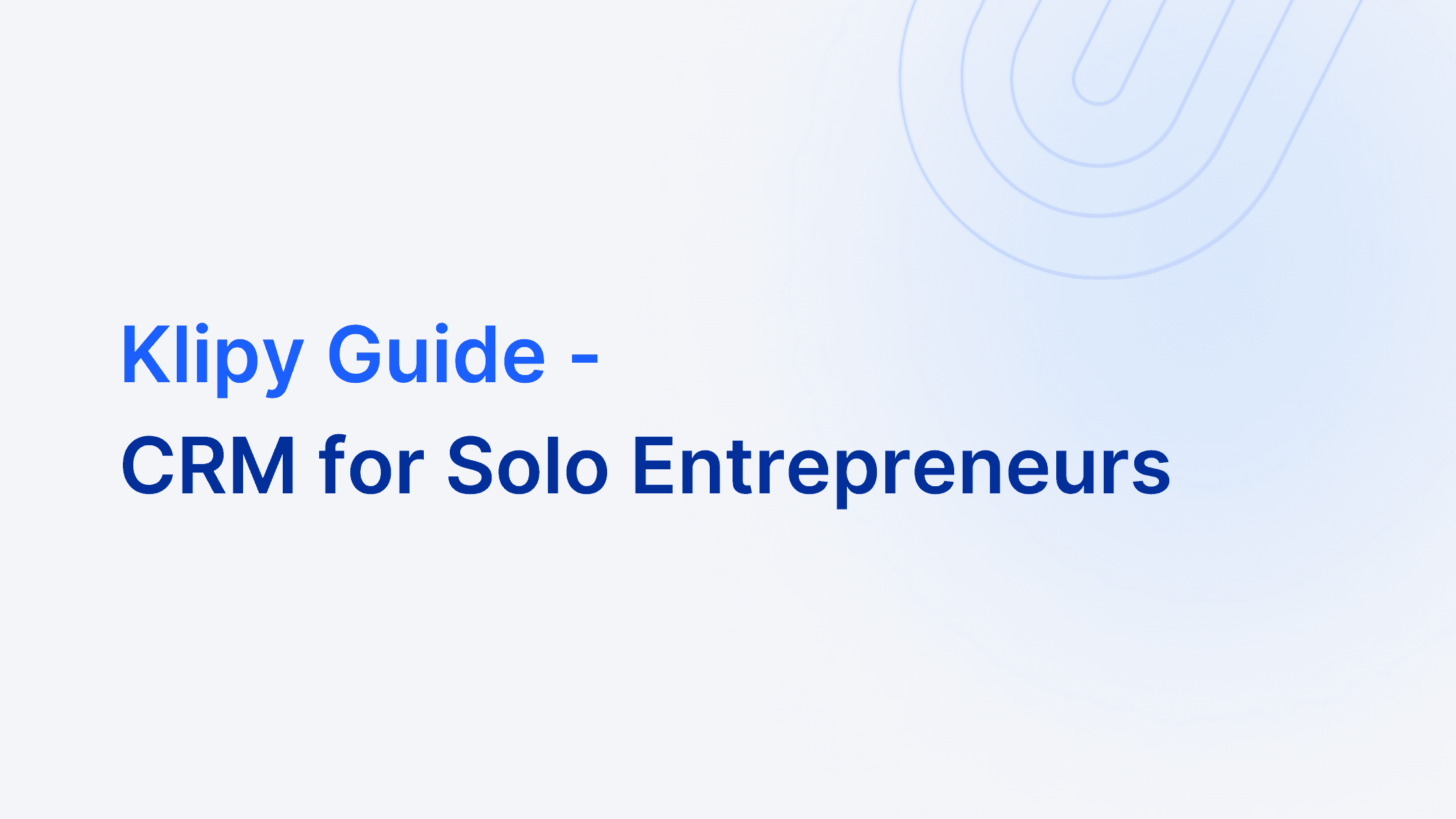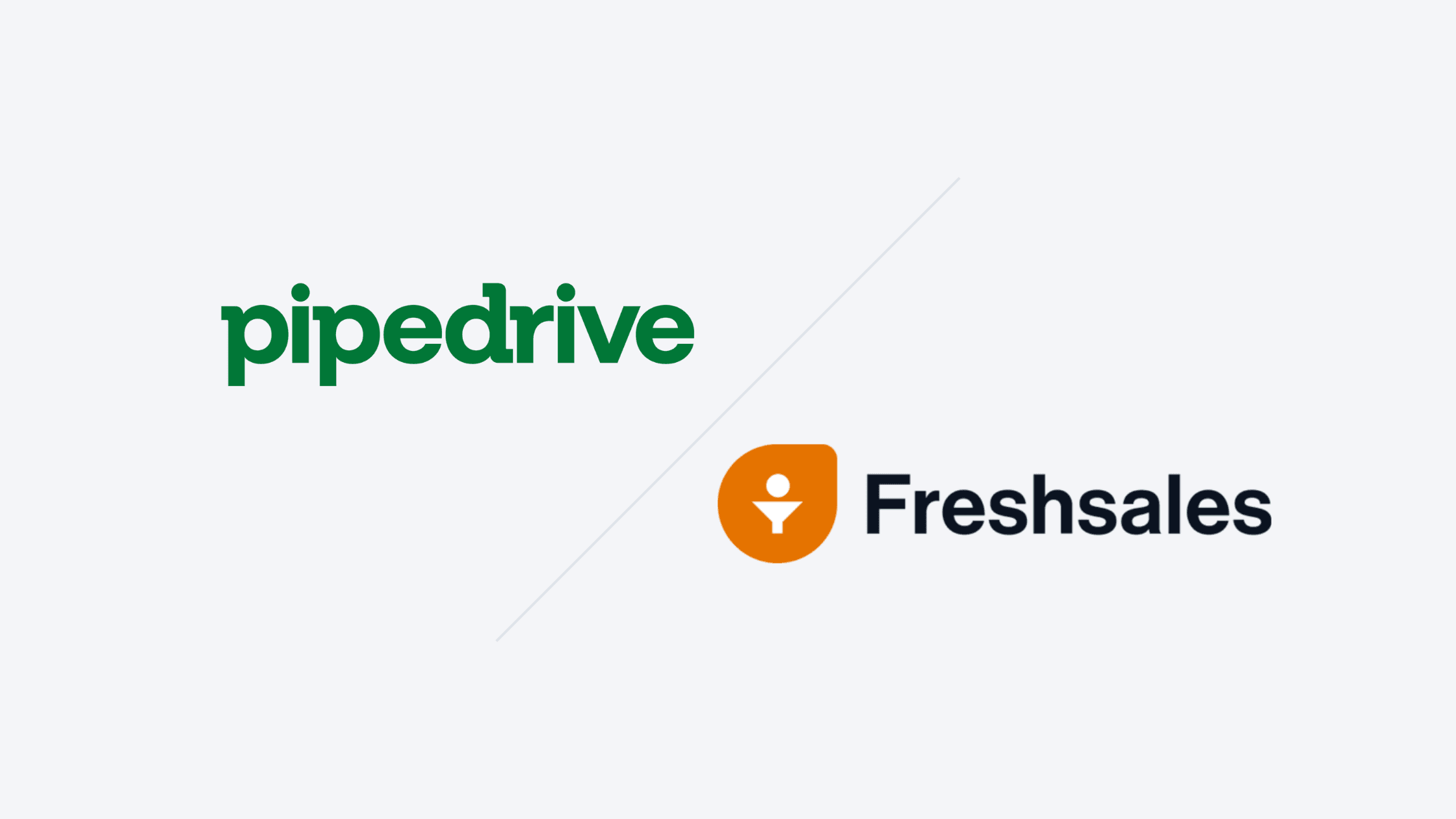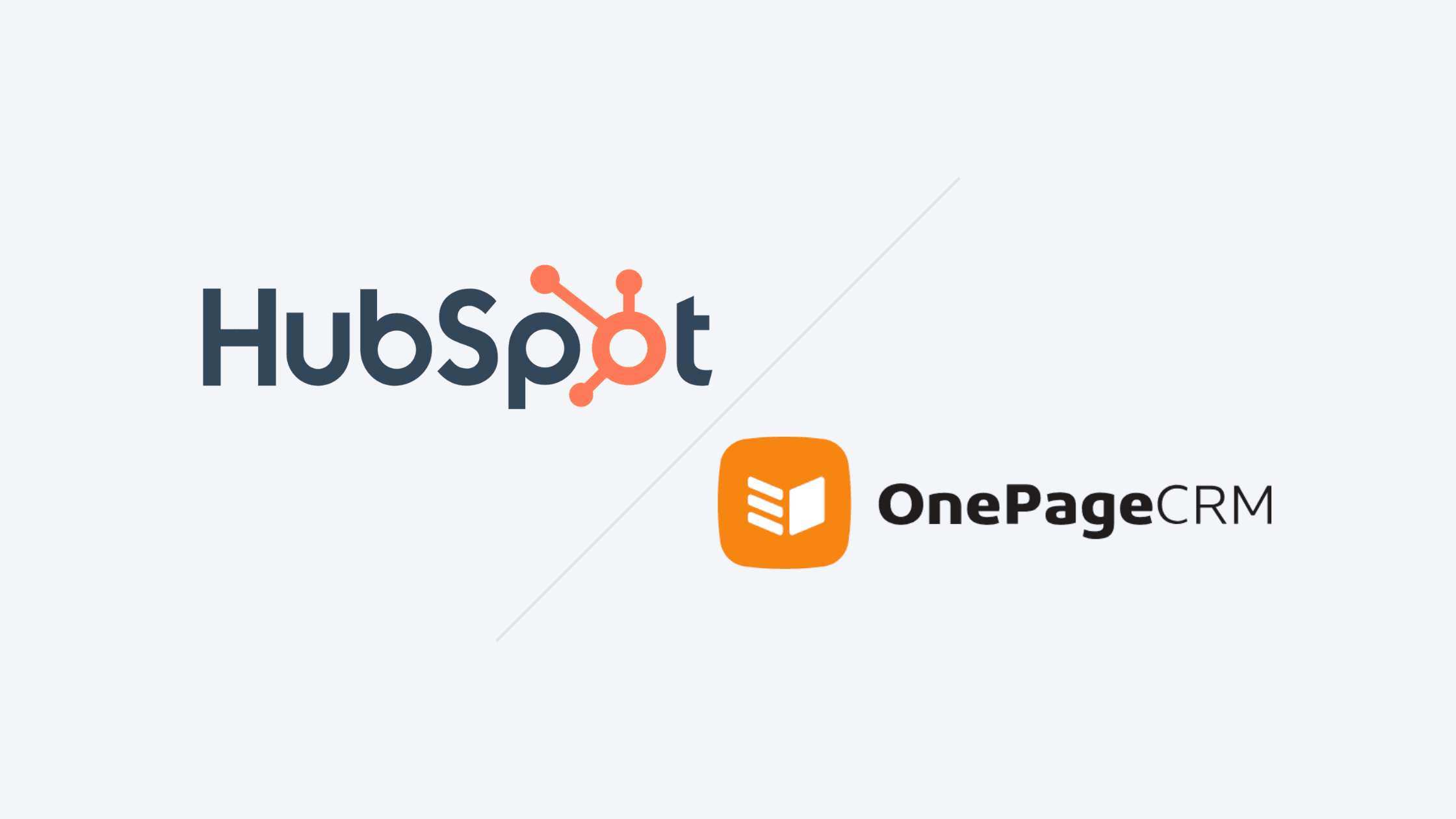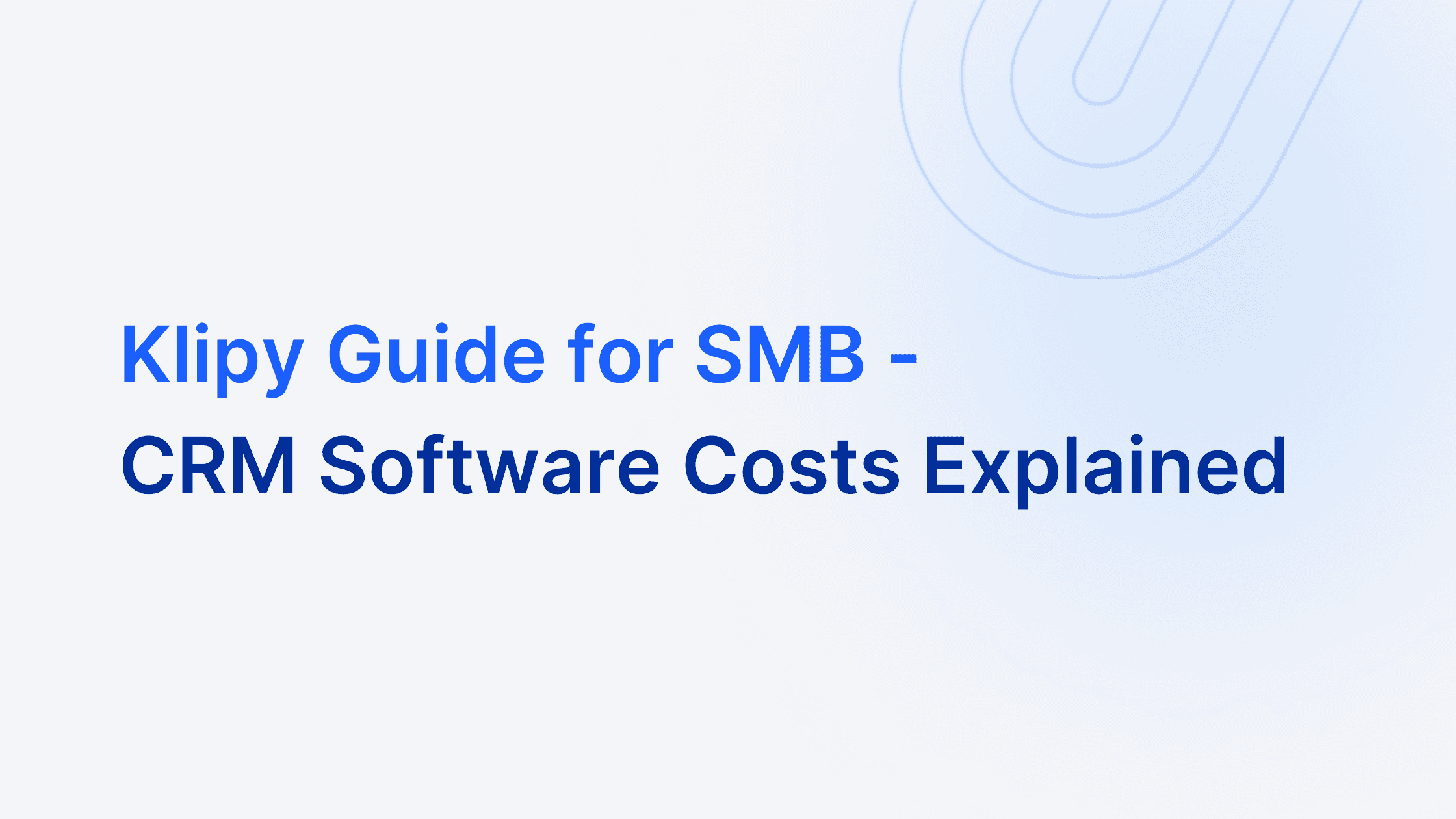Small Business
A Complete Guide to CRM Solutions for Solo Entrepreneurs
Discover how the right CRM can transform a solo entrepreneur's business by enhancing client management and simplifying sales processes.
Why Solo Entrepreneurs Need CRM
Solo entrepreneurs juggle multiple roles and need efficient tools to manage client interactions. A CRM is essential for any one-person business aiming to streamline operations and enhance customer communication. It organizes all your customer data in one place. No more scattered notes or forgotten follow-ups. A CRM helps you track every interaction, ensuring nothing slips through the cracks.
As a solo entrepreneur, time is your most valuable asset. A CRM saves time by automating routine tasks. Need to send follow-up emails or update client records? It happens automatically. This frees up time to focus on growing your business.
A CRM can help your solo business by:
Centralized Hub: Store all customer data in one easily accessible place.
Automation: Automate repetitive tasks like follow-ups and data entry.
Sales Tracking: Keep a close eye on your sales pipeline and manage deals efficiently.
Enhanced Communication: Improve communication with clients through organized interactions.
Managing increasing customer interactions alone can be challenging. A CRM simplifies this by offering a clear overview of your client engagement, allowing you to maintain strong relationships and grow your network effectively.
Key Features of CRM for Solo Entrepreneurs
Boosting Sales with CRM for Solo Business
A CRM boosts sales in your solo business. It lets you manage and segment email lists for targeted communications that connect with your audience. Personalizing your outreach increases engagement and conversion rates.
CRM tools excel at automation. They streamline follow-up processes. You'll always interact with your customers consistently. This builds relationships and creates more sales opportunities.
A CRM helps prioritize tasks by showing what needs attention. This lets you focus on strategic growth activities. With everything organized, you can make smart decisions that drive sales and revenue. For more insights on how CRM systems can enhance business operations and customer relationships, you can explore our guide on understanding the essential role of CRM.
Email Segmentation: Group contacts for targeted marketing.
Automated Follow-Ups: Set up automatic reminders and messages to stay in touch.
Task Management: Track priorities to streamline daily operations.
Customer Insights: Use data to understand clients better and tailor your approach.
A well-maintained CRM system empowers you to enhance your sales strategy. It's more than just managing customer data. It frees up time for growth instead of admin tasks. At Klipy, we help you transform how you interact with clients and manage your business. For small businesses unsure if a CRM is needed, there are key indicators such as the necessity for streamlined tracking and managing multiple contacts which highlight when a small business should consider adopting a CRM system.
Customization and Scalability in CRM
Customization and scalability are key when picking a CRM for solo entrepreneurs. You need a system that grows with your business and adapts to your specific needs. Flexibility is crucial here—your CRM should let you tailor communications and marketing efforts to fit your style and customer base.
Consider the benefits of customizable workflows. They help you align the CRM with your business processes, making your operations smoother and more effective. You can set up the CRM to mirror your sales patterns and customer interactions, ensuring it works just how you need it.
Scalable features are another big plus. As your business expands, your CRM should be ready to handle more contacts, more deals, and more data without a hitch. This means you can start small and add features or capacity as needed, without switching systems. For a detailed evaluation of CRM features essential for small businesses, explore our CRM review and comparison guide which highlights scalability and integration options.
Here’s what to look for:
Flexible Setup: Adjust features to match your business needs.
Workflow Customization: Personalize processes for better efficiency.
Scalability: Expand capabilities as your business grows.
Integration Options: Connect with tools you already use.
Budget-Friendly: Find a plan that fits your current budget with room to upgrade.
With the right CRM, you can focus more on your business and less on administrative headaches. It’s about enhancing effectiveness and efficiency, allowing you to manage client relationships with ease. For insights into choosing the right CRM tailored to small business needs, consider our comprehensive guide on small business CRM.
Choosing the Right CRM for Your Business
Picking the right CRM is crucial for solo entrepreneurs. With so many options, it’s easy to feel overwhelmed. Focus on what matters most: ease of use, integration capabilities, and cost-effectiveness. Here’s how to make an informed choice.
Start with ease of use. You don’t want to spend hours figuring out a complicated system. Look for a CRM with a simple, intuitive interface. It should be quick to set up and easy to navigate, so you can focus on your business, not on learning software.
Integration capabilities are key. Your CRM should connect seamlessly with the tools you already use, like email and calendar apps. This minimizes manual data entry and keeps everything in sync, saving you time and hassle.
Cost is always a consideration. You want a CRM that fits your budget but still covers your needs. Many CRMs offer free trials or basic plans at little to no cost. This way, you can test drive the platform before committing.
Ease of Use: Choose a CRM that’s straightforward and user-friendly.
Integration: Ensure it connects with your existing tools.
Cost-Effectiveness: Look for plans that fit your budget, with room to grow.
Think about scalability. As your business grows, your CRM should grow with you. Consider platforms that offer scalable features, so you can add new capabilities as needed without switching systems. For a detailed look at CRM features that support scalability, explore our Comprehensive Guide to Essential CRM Features for SMEs.
Testing is vital. Take advantage of free trials to see how a CRM works for you. Assess whether it aligns with your workflow and meets your specific business needs. A good CRM supports you with essential features without unnecessary complexity.
Wrap-Up and Key Takeaways
CRM systems benefit solo entrepreneurs by streamlining operations and enhancing client management. They simplify your business life. When choosing a CRM, look for automation, customization, and scalability. CRMs save time, improve customer relationships, and drive sales.
Find a CRM that's user-friendly and integrates with your existing tools. Quick setup and minimal manual data entry are crucial. Features like email integration and automated follow-ups keep you organized and prevent tasks from slipping through the cracks.
Customization allows you to tailor your CRM to your unique business style and needs. This leads to smoother operations and more effective client communication. Select a CRM with scalable features that grow with your business.
The right CRM empowers you to focus on growing your business. It should significantly improve how you manage your business and interact with clients. Consider these factors when selecting a CRM for your solo business:
Ease of use
Integration capabilities
Automation features
Customization options
Scalability
By choosing a CRM that meets these criteria, you'll set yourself up for success as a solo entrepreneur. The right system will help you stay organized, nurture client relationships, and drive business growth.
More from the blog






